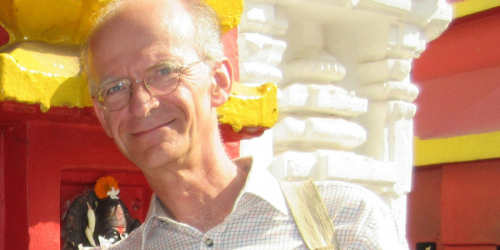
Seek fulfilment by exploring the world's different ways of living and thought
An interview with Dr Nicholas James, Lucy Bye-Fellow and Director of Studies in Social Anthropology
Dr Joe Sutliff Sanders talks about his enchanting career and what he hopes to achieve as a Lucy Cavendish Fellow
Joe is University Associate Professor, Faculty of Education, University of Cambridge. He joined the Faculty of Education after more than a decade teaching in literature departments at universities across the United States. He is a former junior high school English teacher at a small town in Japan and a Fulbright Fellow at the University of Luxemburg.
Tell us about your current career. What did you study and how did that lead into what you're doing now?
My training was in a literature department, with a specialism in US literature from 1850 to 1950, but even then I was already finding that my main passion was for how adults write for and about children. I found myself endlessly fascinated with how children in literature bore the weight of dreams of the future and atonement for the past, how imaginary children could be used to work through national anxieties about discipline, gender, race, cultural position, and so many more.
I discovered almost by accident that a field of academic research in children’s literature existed, and I was excited to bring my training to that field, where I have been very happy. I have an extraordinary range of topics available to me, and I have published books on girls’ novels, Francophone cartoons, animation, children’s comics, metafiction, nonfiction, and just about everything that gives me delight. The field is young and amorphous enough that I have found that I can research any period, genre, form, or topic that interests me. It’s a rare gift as an academic!
What have been the best and worst moments of your study or career so far?
The best moments have all had to do with either engaging with the international critical conversation or lifting up new scholars who have gone on to do great things. One of my happiest moments was seeing my first doctoral student sail through her examinations with confidence, vision, and grace.
What inspired you to pursue this career? What are your key motivations?
I tried not to be an academic, tried specifically not to do literary studies, but everything else was just so drab. Whatever success I had in other venues and topics, I always found myself looking longingly back at joining into conversations about books that I loved. To this day, the reason I teach and research is that I love being part of an ongoing, feisty conversation between people who care deeply about what they read.
What would be your advice to students who wanted to pursue a similar career?
Find that narrow overlap between what sustains you intellectually and what will sustain you professionally and—not to put too fine a point on it—financially. If you give in entirely to one without consulting the other, you are likely to have many moments of regret. Also remember that you need to find a way to balance your own vision (of the world, of your work, of what you find valuable) with what is interesting and relevant to the rest of your community. A brilliant idea that is not useful to the others in your field will leave you very lonely; a brilliant idea that others revise and extend and even fix will be endlessly rewarding.
What attracted you to Lucy Cavendish and what would you like to achieve here?
When I interviewed with our extraordinary Senior Tutor and asked what Lucy’s identity would be now that we are accepting all genders, she said that the new identity is continuous with the old identity: we want to be the Cambridge college for people who never imagined they could find a home at Cambridge. It was at that moment that I knew I wanted to help with Lucy’s mission.
As a Fellow, I want to help make Lucy the College that people first think of when they think of widening participation at Cambridge. I also have a deep love for comic books (“graphic novels,” as they are called by people concerned about sounding terribly serious), and I would love to help Lucy’s library become the place to go for graphic novels at Cambridge.